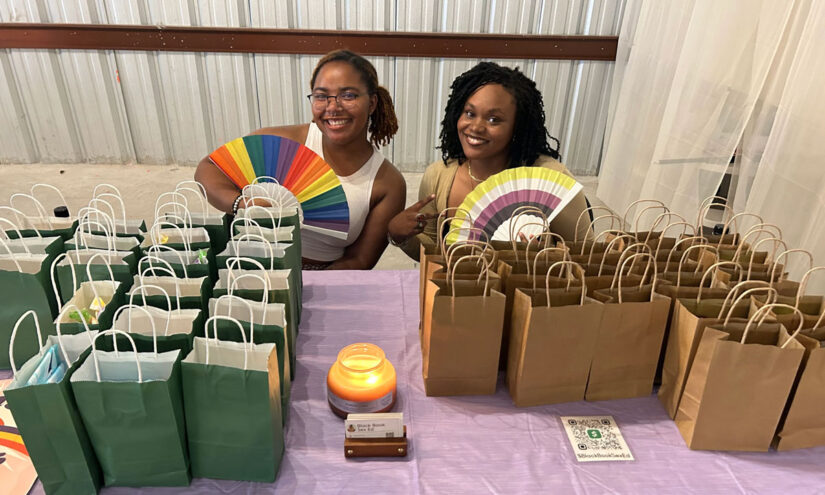During this summer, a team of students from MIT embarked on a journey to the sou …
Grassroots College Networks Provide Emergency Contraceptives on Campus
Carlos Changemaker

Limya Harvey and Cydney Mumford regularly set up a table on the University of Texas-San Antonio campus to distribute kits filled with emergency contraceptives, condoms, and lube, or menstrual products like tampons and pads. They usually bring 50 kits of each type and everything is typically gone within an hour or two.
Harvey and Mumford, both 19-year-old sophomores, established the organization Black Book Sex Ed to educate students and others about sexual health. They aim to connect them with free services and products that are packaged into kits distributed on campus, in the community, and through their website.
“We both came from lower-income backgrounds,” Mumford said. “So we have a soft spot for people who say, ‘Oh, I just don’t have it right now.’ That’s part of the reason we started doing this.”
Harvey and Mumford have noticed a growing trend of students on college campuses across the country providing free or low-cost emergency contraceptives, birth control, and menstrual products. They are also responding to threats against reproductive freedom following the U.S. Supreme Court’s Dobbs decision last year, which eliminated federal abortion protections.
Sometimes, policymakers express concerns that access to emergency contraceptives and other forms of birth control might erode due to confusion between drugs that prevent pregnancy and medications used for abortions, particularly in states where abortion is banned or heavily restricted.
“Our requests for help have quadrupled since Dobbs,” said Kelly Cleland, the executive director of the American Society for Emergency Contraception. This organization offers toolkits and technical assistance for students to establish peer-to-peer distribution networks that provide emergency contraceptives and even bring vending machines carrying the medications and other health care products to campuses. The program has worked with students at over 200 campuses.
According to Cleland, students distributing emergency contraceptive pills are generally not at legal risk as long as the products are in original packaging, unexpired, and no medical advice is given. “It’s like giving a friend a Tylenol,” one advocate explained.
“Peer-to-peer distribution networks are really growing and offer new options for people to get what they need in trusted ways, especially in states like Texas that face repercussions from the Dobbs decision,” said Mara Gandal-Powers, the director of birth control access at the National Women’s Law Center.
Harvey and Mumford’s kits, like many other student groups, include donated products such as emergency contraceptive pills, tampons, and lube. Black Book Sex Ed also accepts financial donations, which they use to purchase items from big-box stores.
The University of Texas-San Antonio did not respond to requests for comment.
At Bowie State University in Maryland, a graduate student named Jakeya Johnson took a different approach to improve student access to contraceptives. Johnson, who was pursuing a master’s degree in public administration and policy, researched the availability of reproductive health care at Bowie State and discovered that options were limited. She proposed the installation of a vending machine stocked with emergency contraceptives, condoms, pregnancy tests, and other sexual health products. However, the college claimed they lacked funds for the machines.
Johnson then approached State Senator Ariana Kelly about introducing a bill that would require schools to provide access to emergency contraceptives and other contraceptive services. The bill, which was signed in May, mandates schools to provide these services by August 2024.
Johnson believes the legislation affirms the direction they were already heading. Through a public service fellowship, Johnson has worked with the student health center at Bowie State to develop a blueprint that other schools can follow to improve access to reproductive health care.
“In 2023, we shouldn’t have to be fighting for this,” Johnson said. “We should already have it.”
Michele Richardson, the director of the Henry Wise Wellness Center at Bowie State, also sees the legislation as confirmation of their efforts. The school is currently working on bringing wellness vending machines to campus by August.
Increasing access remains a challenge in other places. At Loyola University Chicago, members of the organization Students for Reproductive Justice face restrictions on hosting events and reserving meeting space on campus. On the other hand, the Loyola for Life group, which opposes abortion, does not face similar limitations.
Loyola only permits registered student organizations that align with its values as a Jesuit, Catholic institution to host events or reserve space on campus. Oral contraceptives are provided solely for reasons unrelated to preventing pregnancy, and resident advisors are not allowed to distribute condoms or other forms of birth control.
To counter these restrictions, Students for Reproductive Justice takes orders for emergency contraception by email. They provide kits containing emergency contraceptive pills, pregnancy tests, pads, and liners to students either on campus or nearby. Over the past two years, they have fulfilled orders for over 100 kits.
After the Dobbs ruling, the number of requests for emergency contraception significantly increased. Students for Reproductive Justice posted on Instagram urging students not to stockpile pills due to limited supplies.
Beaudouin acknowledges that university officials may not be aware of their distribution efforts on campus. They have encountered resistance from Loyola for Life during off-campus condom distribution events but have seen improvements since asking them to stop. Loyola for Life did not respond to a request for comment.
The national anti-abortion group Students for Life of America does not object to students distributing free pregnancy tests and menstrual products. However, they take issue with emergency contraception, which they believe causes abortion. Nonetheless, they do not think reproductive justice groups should be banned from operating on campus.
“We’re not going to say whether a group should be denied the right to exist because that has happened a lot to us,” said Kate Maloney, the manager of the group’s Campaign for Abortion Free Cities.


